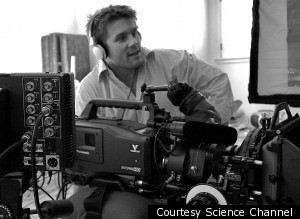Gene Roddenberry's Son Reveals Unhappy 'Star Trek' Family Life – HuffPost
Writer, Editor, HuffPost
Boldly going where no one has gone before, the Science Channel is premiering a new documentary, “Trek Nation,” Wednesday night. It looks at the 45-year “Star Trek” franchise from the point of view of its host and executive producer, Rod Roddenberry, son of Gene Roddenberry, the man who gave the world his optimistic vision of a future, 300 years from now.
But this television special isn’t just all about the “Trek” phenomenon, which — beginning in 1966 — comprised six television series, 11 motion pictures, and scores of games and novels.
“Trek Nation” is both an homage to Gene Roddenberry and a touching exploration of his son’s personal quest to learn more about his father’s life and vision of the future — a quest born out of an early life where father and son didn’t have a loving, bonding relationship.
“I wasn’t a ‘Star Trek’ fan as a kid, I didn’t get it, I didn’t know it and I didn’t watch it,” Rod Roddenberry told The Huffington Post.
“It wasn’t until my father passed away that I heard at his memorial service [in 1991], someone went up on stage and read a letter from a fan that talked about how ‘Star Trek’ had really changed their life. And it was at that moment that I was shocked. I said, ‘My father? Star Trek? What’s this all about?'”
The young Roddenberry was only 17 when his famous father died, never fully understanding the impact that Gene Roddenberry had not only on American television, but on the whole world and the culture of science fiction.
“I spent several years trying to figure out what ‘Trek’ was all about, and was indirectly inspired by the 1997 documentary ‘Trekkies,'” Roddenberry said. “When that came out, it showed the extreme sides of fandom and it really didn’t resonate too well with me.
“And I wanted to show the world my experience with fans and it was really the diversity of fans out there that touched me — so many people from all over the world.”
Roddenberry (pictured below) started work on “Trek Nation” in 2001, first attending “Trek” conventions.
“I found this commonality among the fans. If ‘Star Trek’ didn’t show them a better future and give them optimism, it at least gave them the belief to reach beyond their perceived limitations.
“So, whether they were handicapped, or at a young age told they couldn’t be something one day, ‘Star Trek’ helped them believe that they could. And that was sort of its universal theme. And I wanted to do a documentary about the fans,” he said.
Roddenberry admits that, as legions of worldwide fans grew around “Star Trek,” his home life wasn’t perfect.
“It was so hard in this documentary to get 45 years of ‘Star Trek’ and my father’s life in it, and there were so many things that were left out, and one of them — which turns my stomach — is my mother.”
Roddenberry’s mother, Majel Barrett, was present throughout much of the “Star Trek” television world, appearing in the original TV pilot, then as the U.S.S. Enterprise’s Nurse Chapel, followed by her dual role as Lwaxana Troi and the voice of the Enterprise computer on “Star Trek: The Next Generation.”
“My mother’s in the documentary, but we put many cuts together early on that went more into home life and my life and my relationship with my mother that was just a can of worms, and I don’t mean that in a disrespectful way,” Roddenberry said.
“And she doesn’t get enough credit [for her role and importance to the ‘Trek’ franchise], and I’m almost embarrassed that we couldn’t put more of her in there.”
“Trek Nation” features tributes from a variety of fans, including “Star Wars” creator George Lucas and “Star Trek” movie director J.J. Abrams.
And then there’s Nichelle Nichols, known throughout the world as U.S.S. Enterprise Communications Officer Lt. Uhura. She told HuffPost about her relationship with Rod Roddenberry.
“Oh, he’s my kid! He’s very special and he’s produced this wonderful film — a son’s journey to learn about his father. Once Gene died, everybody was trying to take over the ‘Trek’ mantle, and I told Rod to find out about his dad.
“Gene certainly changed the face of television forever and he changed the world in how we think and what we can do and who we are,” Nichols said.
“‘Star Trek’ certainly defined science fiction. I remember when I was a kid and if you saw somebody with a book wrapped in brown paper, you could figure they were reading science fiction — if you were reading science fiction, you were weird,” she added. “Through ‘Star Trek,’ he took the weird out of it and gave respect to science fiction.”
Nichols recalls the day she was interviewed for this new television series called “Star Trek.”
“They gave me a three-page script to read from that had three characters named Bones, Kirk and somebody called Spock, and they asked me if I would read for the role of Spock. When I looked at this great text, I said to myself, ‘I’ll take any one of these roles,’ but I found the Spock character to be very interesting, and I asked them to tell me what she [Spock] was like.”
Of course, Nichols (pictured below, then and now) eventually won the role of Uhura, from the futuristic United States of Africa, as chief communications officer of the first starship.
She wasn’t fully aware at first about the impact “Star Trek” was having on television viewers and the ways her Uhura character was affecting many African Americans during the turbulent time of the civil rights movement.
When Nichols told Gene Roddenberry she wasn’t planning to return to the series after the first season, he advised her to think about it for a couple of days. At a fundraiser the next night, one of the organizers told her there was someone there who really wanted to meet her because he was her greatest fan.
“When I turned around, I was looking into the face of Dr. Martin Luther King, walking toward me with a big smile on his face,” she recalled.
“And he said, ‘Yes, Miss Nichols, I am your greatest fan.’ How amazing is that! My mouth kept opening and closing as he began to tell me what my role meant, not just to ‘Star Trek,’ but for people all over the world.
“When I could finally catch my breath after hearing so many accolades from a man I considered as my leader, I thanked him and then told him I was leaving the series. His face completely changed and he said, ‘No! You are our image of where we’re going, you’re 300 years from now, and that means that’s where we are and it takes place now. Keep doing what you’re doing, you are our inspiration.'”
And then the leader of the civil rights movement told Nichols, “Besides, ‘Star Trek’ is the only show that my wife, Coretta, and I will allow our little children to stay up late and watch. YOU are their hero.”
When Nichols told Roddenberry about her encounter with King, the “Star Trek” creator said, “‘God bless Dr. Martin Luther King. Somebody knows what I’m trying to achieve here.’ And a big tear came down his face. And Gene was not a man to cry.”
“Trek Nation” is filled with heartfelt stories like these and never-before-seen home movies from the Roddenberry family collection.
And Rod Roddenberry looks back on his own trek to discover things about his father that he never knew.
“He was presented to me as sort of this Greek god. How does a son identify or connect with someone like that? Doing the documentary was about bringing him to a level where I could identify and connect,” Roddenberry said.
“And that made me love him more, because he was an average, normal guy who made mistakes, who still had this amazing vision and optimism for the future, worked his ass off and got his vision out there,” he added. “I want to continue that tradition of a better future, of people believing in us, believing in humanity.”
“Trek Nation” premieres Wednesday night on the Science Channel and will be shown throughout December.
At HuffPost, we believe that everyone needs high-quality journalism, but we understand that not everyone can afford to pay for expensive news subscriptions. That is why we are committed to providing deeply reported, carefully fact-checked news that is freely accessible to everyone.
Whether you come to HuffPost for updates on the 2024 presidential race, hard-hitting investigations into critical issues facing our country today, or trending stories that make you laugh, we appreciate you. The truth is, news costs money to produce, and we are proud that we have never put our stories behind an expensive paywall.
Would you join us to help keep our stories free for all? Your contribution of as little as $2 will go a long way.
As Americans head to the polls in 2024, the very future of our country is at stake. At HuffPost, we believe that a free press is critical to having well-informed voters. That's why our journalism is free for everyone, even though other newsrooms retreat behind expensive paywalls.
We cannot do this without your help. Support our newsroom by contributing as little as $2 to keep our news free for all.
As Americans head to the polls in 2024, the very future of our country is at stake. At HuffPost, we believe that a free press is critical to creating well-informed voters. That's why our journalism is free for everyone, even though other newsrooms retreat behind expensive paywalls.
Our journalists will continue to cover the twists and turns during this historic presidential election. With your help, we'll bring you hard-hitting investigations, well-researched analysis and timely takes you can't find elsewhere. Reporting in this current political climate is a responsibility we do not take lightly, and we thank you for your support.
Contribute as little as $2 to keep our news free for all.
Writer, Editor, HuffPost
Do you have info to share with HuffPost reporters? Here’s how.
By entering your email and clicking Sign Up, you’re agreeing to let us send you customized marketing messages about us and our advertising partners. You are also agreeing to our Terms of Service and Privacy Policy.


